air condition CITROEN C-ELYSÉE 2016 Owners Manual
[x] Cancel search | Manufacturer: CITROEN, Model Year: 2016, Model line: C-ELYSÉE, Model: CITROEN C-ELYSÉE 2016Pages: 260, PDF Size: 7.11 MB
Page 4 of 260
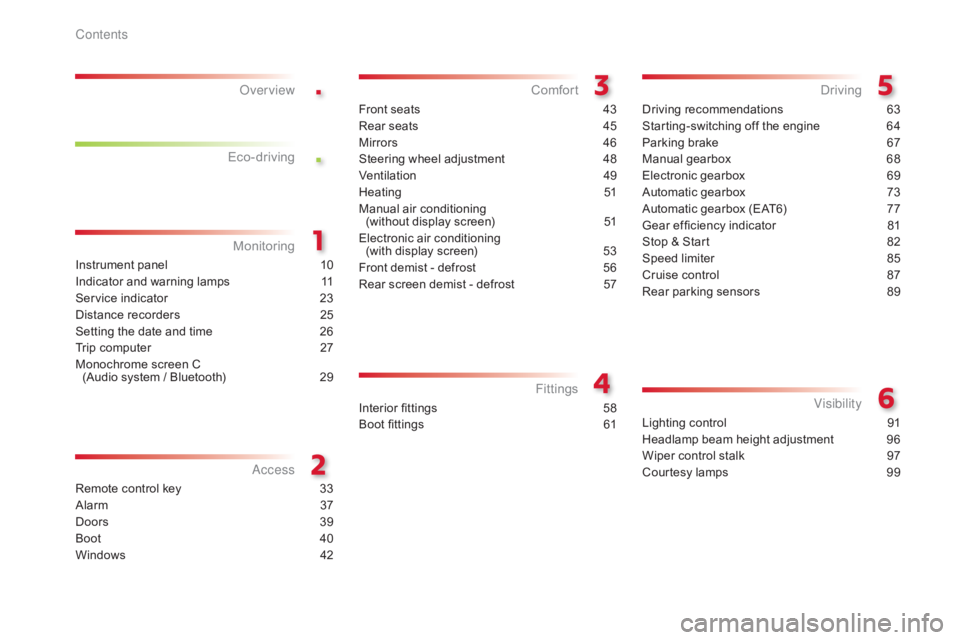
.
.
C-elysee_en_Chap00a_sommaire_ed01-2016
Instrument panel 10
Indicator and warning lamps
1
1
Service
indicator
2
3
Distance
recorders
2
5
Setting
the date and time
2
6
Trip
computer
2
7
Monochrome
screen C
(Audio
system / Bluetooth)
2
9
MonitoringOver view
Remote control key 3
3
Alarm
3
7
Doors
39
Boo
t
4
0
Windows
4
2
Access
Front seats 43
Rear seats
4
5
Mirrors
4
6
Steering
wheel adjustment
4
8
Ventilation
4
9
Heating
5
1
Manual
a
ir
c
onditioning
(
without display screen)
5
1
Electronic
air conditioning
(with
display screen)
5
3
Front
demist - defrost
5
6
Rear
screen demist - defrost
5
7
Comfort
Driving recommendations 63
Starting-switching off the engine
6
4
Parking
brake
6
7
Manual
g
earbox
6
8
Electronic
gearbox
6
9
Automatic
gearbox
7
3
Automatic
gearbox (EAT6)
7
7
Gear
ef ficiency indicator
8
1
Stop
& Start
8
2
Speed
limiter
8
5
Cruise
control
87
R
ear parking sensors
8
9
Driving
Lighting control 91
Headlamp beam height adjustment
9
6
Wiper
control stalk
9
7
Courtesy
lamps
9
9
Visibility
Eco-drivingInterior fittings 5
8
Boot fittings
6
1
Fittings
Contents
Page 7 of 260
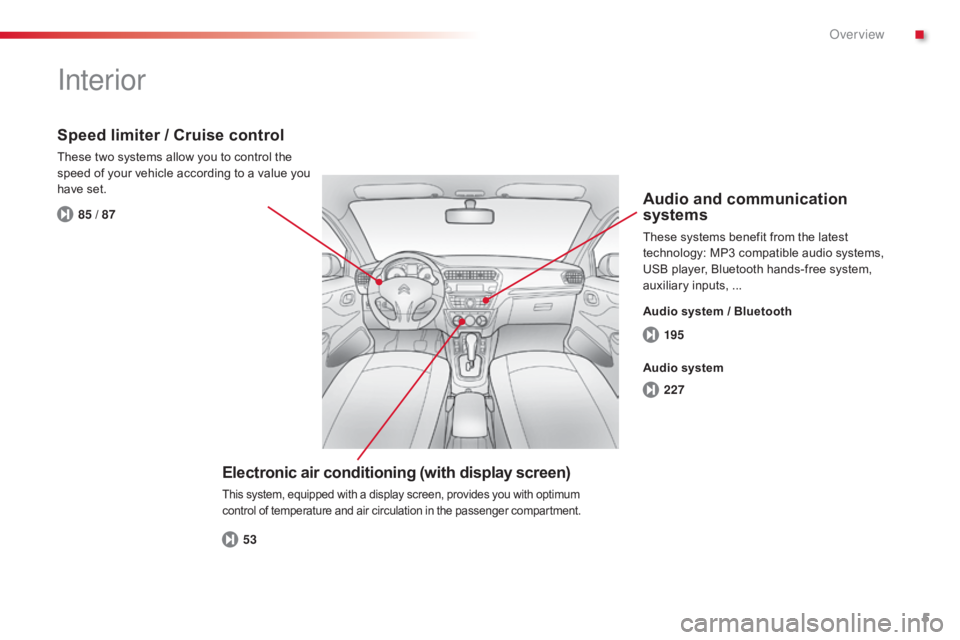
5
195
227
53
85 / 87
C-elysee_en_Chap00b_vue-ensemble_ed01-2016
Interior
Electronic air conditioning (with display screen)
This system, equipped with a display screen, provides you with optimum control of temperature and air circulation in the passenger compartment.
Speed limiter / Cruise control
These two systems allow you to control the speed of your vehicle according to a value you
h
ave set.
Audio and communication
systems
These systems benefit from the latest technology: MP3 compatible audio systems,
U
SB player, Bluetooth hands-free system,
a
uxiliary inputs, ...
Audio system / Bluetooth
Audio system
.
Over view
Page 9 of 260
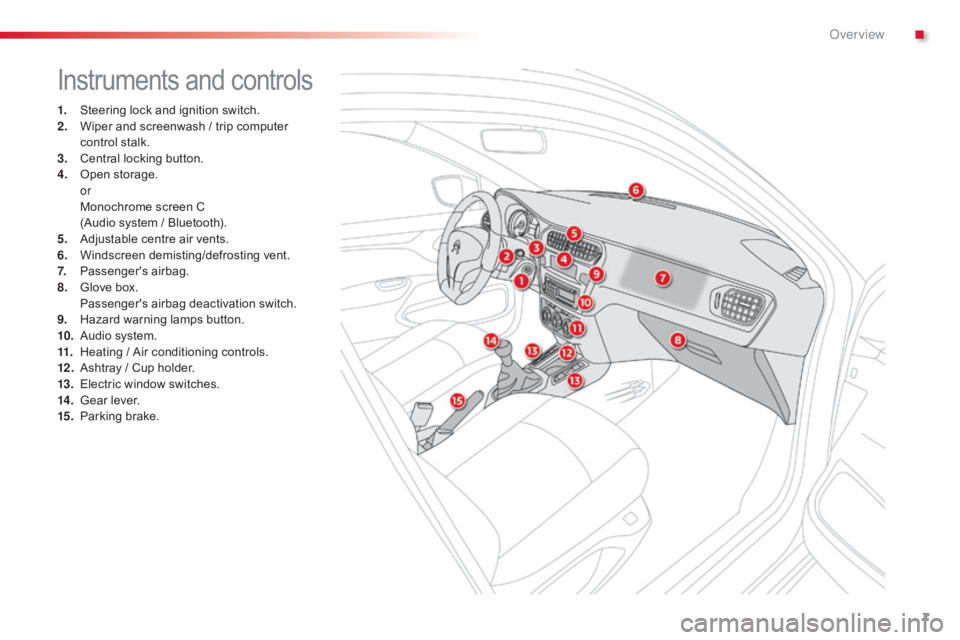
7
C-elysee_en_Chap00b_vue-ensemble_ed01-2016
Instruments and controls
1. Steering lock and ignition switch.
2. W iper and screenwash / trip computer
c
ontrol stalk.
3.
C
entral locking button.
4.
O
pen
s
torage.
or
M
onochrome screen C
(Audio
system / Bluetooth).
5.
A
djustable centre air vents.
6.
W
indscreen
d
emisting/defrosting
v
ent.
7.
P
assenger's
ai
rbag.
8.
G
love box.
P
assenger's airbag deactivation switch.
9.
H
azard warning lamps button.
10.
A
udio system.
11.
H
eating / Air conditioning controls.
12 .
A
shtray / Cup holder.
13.
E
lectric window switches.
14 .
G
ear lever.
15.
P
arking brake.
.
Over view
Page 10 of 260
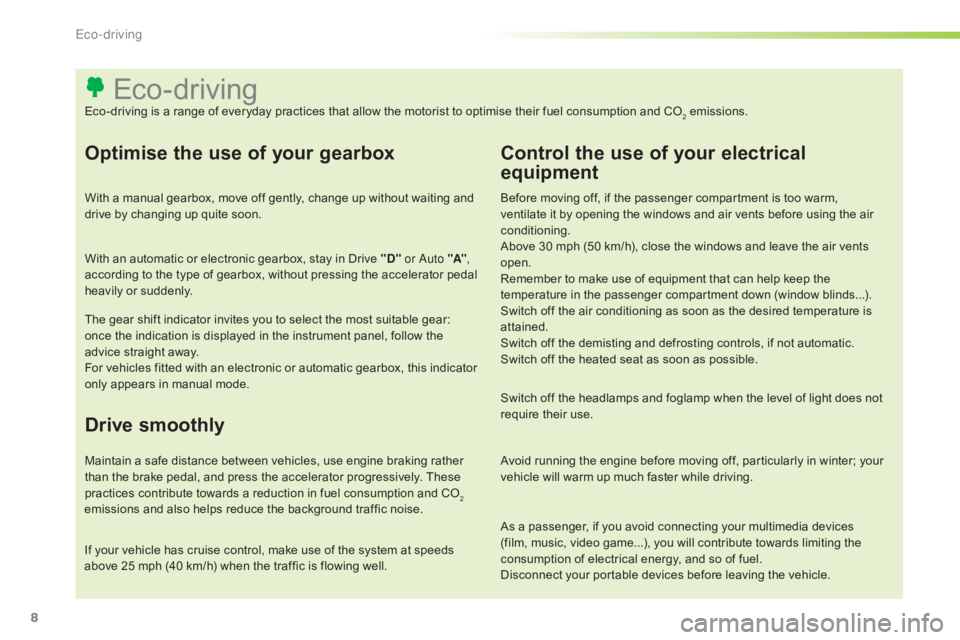
8
As a passenger, if you avoid connecting your multimedia devices (film, music, video game...), you will contribute towards limiting the
c
onsumption of electrical energy, and so of fuel.
Disconnect
your portable devices before leaving the vehicle.
Eco-driving
Eco-driving is a range of everyday practices that allow the motorist to optimise their fuel consumption and CO2 emissions.
Optimise the use of your gearbox
With a manual gearbox, move off gently, change up without waiting and drive by changing up quite soon.
With
an automatic or electronic gearbox, stay in Drive "D" or Auto "A" ,
according
to the type of gearbox, without pressing the accelerator pedal
hea
vily
o
r
s
uddenly.
The
gear shift indicator invites you to select the most suitable gear:
o
nce the indication is displayed in the instrument panel, follow the
a
dvice straight away.
For
vehicles fitted with an electronic or automatic gearbox, this indicator
o
nly appears in manual mode.
Drive smoothly
Maintain a safe distance between vehicles, use engine braking rather than the brake pedal, and press the accelerator progressively. These
p
ractices contribute towards a reduction in fuel consumption and CO
2
emissions
and
also
helps
reduce
the
background
traffic
noise.
If
your
vehicle
has
cruise
control,
make
use
of
the
system
at
speeds
a
bove
25
mph
(40
km/h)
when
the
traffic
is
flowing
well.
Control the use of your electrical
equipment
Before moving off, if the passenger compartment is too warm, v entilate it by opening the windows and air vents before using the air
c
onditioning.
Above
30 mph (50 km/h), close the windows and leave the air vents
ope
n.
Remember
to make use of equipment that can help keep the
t
emperature in the passenger compartment down (window blinds...).
Switch
off the air conditioning as soon as the desired temperature is
a
ttained.
Switch
off the demisting and defrosting controls, if not automatic.
Switch
off the heated seat as soon as possible.
Switch
off the headlamps and foglamp when the level of light does not
r
equire their use.
Avoid
running the engine before moving off, particularly in winter; your
v
ehicle will warm up much faster while driving.
Eco-driving
Page 52 of 260
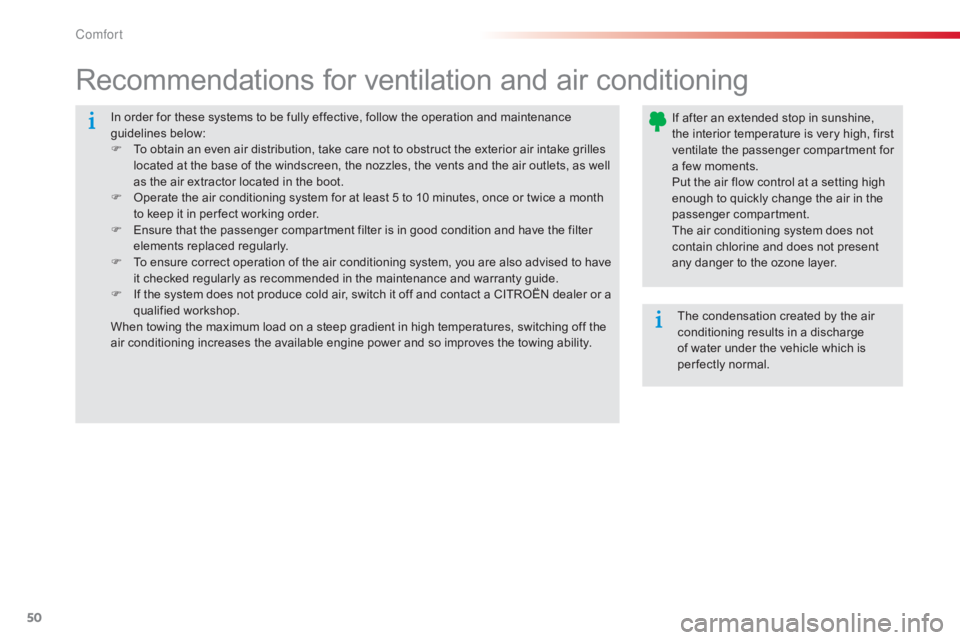
50
C-elysee_en_Chap03_confort_ed01-2016
In order for these systems to be fully effective, follow the operation and maintenance guidelines belo w:
F
T
o obtain an even air distribution, take care not to obstruct the exterior air intake grilles
l
ocated at the base of the windscreen, the nozzles, the vents and the air outlets, as well
a
s the air extractor located in the boot.
F
O
perate the air conditioning system for at least 5 to 10 minutes, once or twice a month
t
o keep it in per fect working order.
F
E
nsure that the passenger compartment filter is in good condition and have the filter
e
lements replaced regularly.
F
T
o ensure correct operation of the air conditioning system, you are also advised to have
i
t checked regularly as recommended in the maintenance and warranty guide.
F
I
f the system does not produce cold air, switch it off and contact a CITROËN dealer or a
q
ualified
w
orkshop.
When
towing the maximum load on a steep gradient in high temperatures, switching off the
a
ir conditioning increases the available engine power and so improves the towing ability.
Recommendations for ventilation and air conditioning
If after an extended stop in sunshine, the i nterior t emperature i s v ery h igh, f irst
v
entilate the passenger compartment for
a
few moments.
Put
the air flow control at a setting high
e
nough to quickly change the air in the
p
assenger
c
ompartment.
The
air conditioning system does not
c
ontain chlorine and does not present
a
ny danger to the ozone layer.
The
condensation created by the air
c
onditioning results in a discharge
o
f water under the vehicle which is
p
er fectly normal.
C
Page 53 of 260
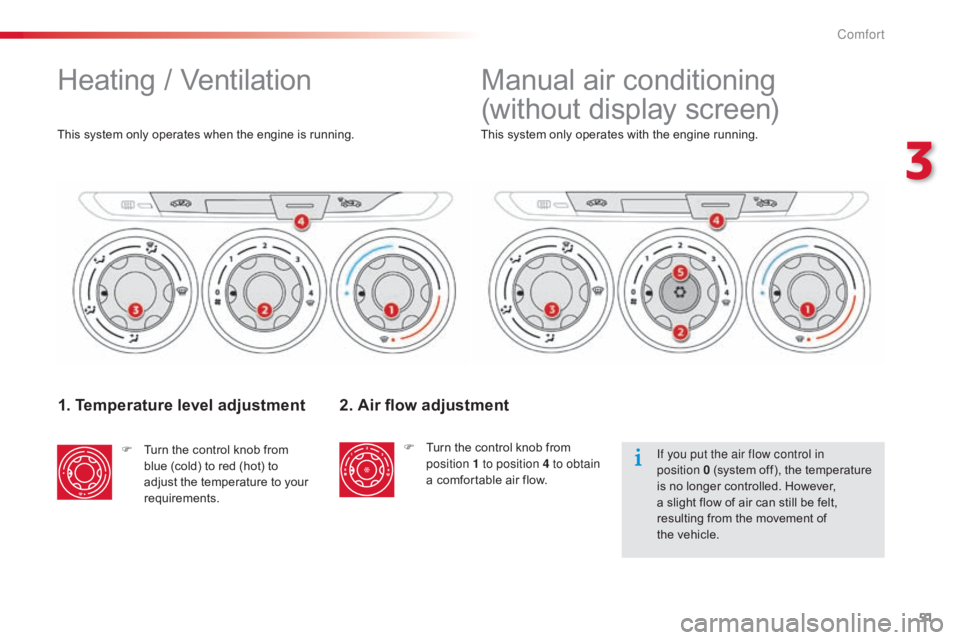
51
C-elysee_en_Chap03_confort_ed01-2016
1. Temperature level adjustment
F Turn the control knob from b
lue (cold) to red (hot) to
a
djust the temperature to your
r
equirements. This
system only operates with the engine running.
2. Air flow adjustment
F Turn
the control knob from p
osition 1 to position 4 to obtain
a
comfortable air flow. If you put the air flow control in
position 0
(system off), the temperature
i
s no longer controlled. However,
a
slight flow of air can still be felt,
r
esulting from the movement of
t
he vehicle.
Manual air conditioning
( without display screen)
Heating
/
Ventilation
This system only operates when the engine is running.
3
Comfort
Page 54 of 260
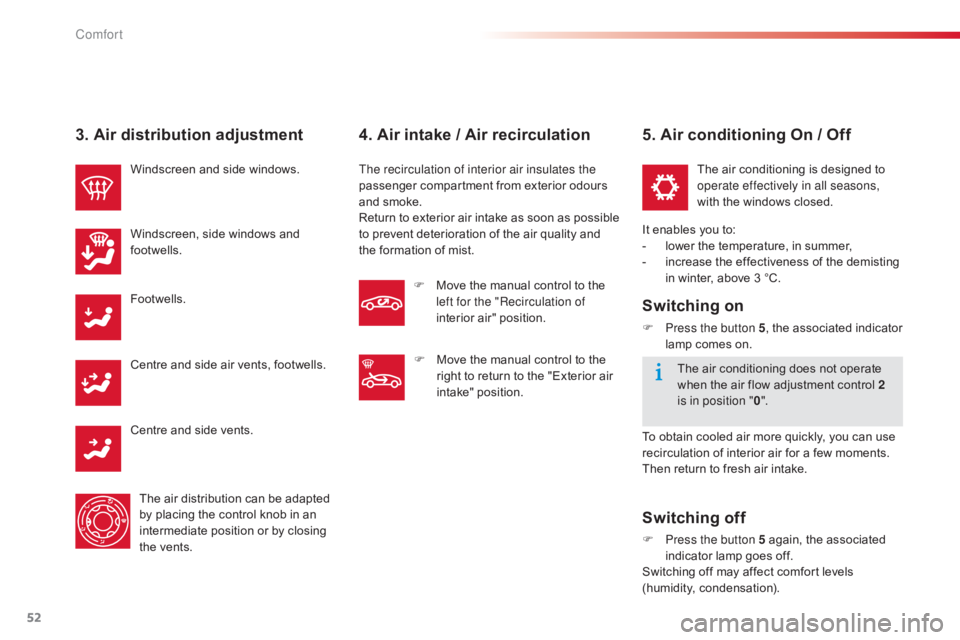
52
C-elysee_en_Chap03_confort_ed01-2016
3. Air distribution adjustment
Windscreen and side windows.
W indscreen, side windows and
f
ootwells.
Footwells.
Centre
and side air vents, footwells.
The
air distribution can be adapted
b
y placing the control knob in an
i
ntermediate position or by closing
t
he vents. F
M
ove the manual control to the
r
ight to return to the "Exterior air
i
ntake" position.
F
M
ove the manual control to the
l
eft for the "Recirculation of
interior
air" position.
5. Air conditioning On / Off
It enables you to:
- l ower the temperature, in summer,
-
i
ncrease the effectiveness of the demisting
i
n winter, above 3 °C.
Switching on
F Press the button 5 , the associated indicator l
amp comes on.
Switching off
F Press the button 5 again, the associated i
ndicator lamp goes off.
Switching
off may affect comfort levels
(
humidity,
c
ondensation).
The
air conditioning is designed to
ope
rate effectively in all seasons,
with the windows closed.
The air conditioning does not operate
w
hen the air flow adjustment control 2
is in position " 0".
To obtain cooled air more quickly, you can use
r
ecirculation of interior air for a few moments.
T
hen return to fresh air intake.
Centre
and
side
vents.
4. Air intake / Air recirculation
The recirculation of interior air insulates the
passenger
compartment from exterior odours
a
nd smoke.
Return
to exterior air intake as soon as possible
t
o prevent deterioration of the air quality and
t
he formation of mist.
Comfort
Page 55 of 260
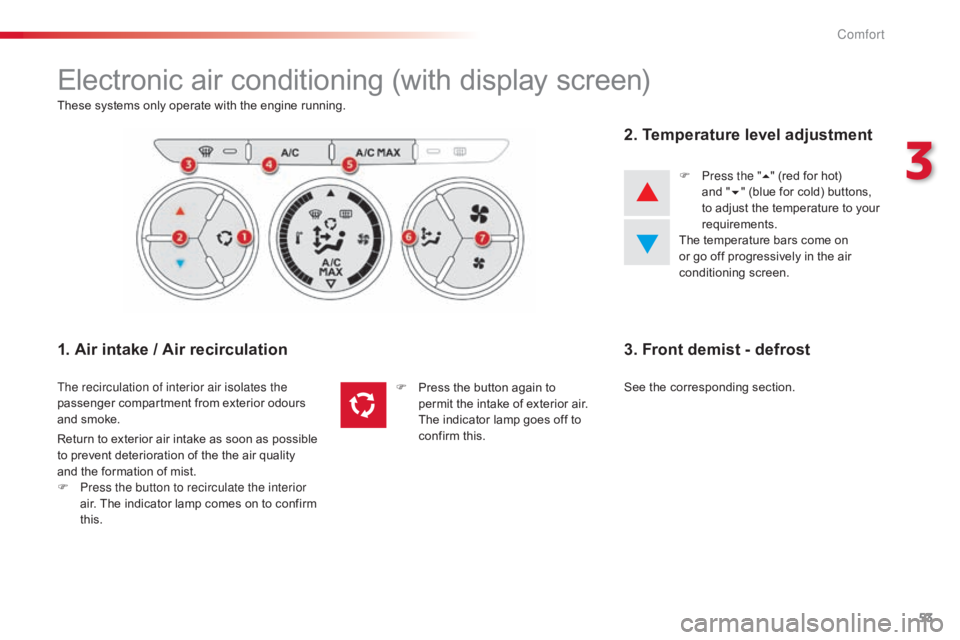
53
C-elysee_en_Chap03_confort_ed01-2016
Electronic air conditioning (with display screen)
These systems only operate with the engine running.
1. Air intake / Air recirculation
The recirculation of interior air isolates the
passenger compartment from exterior odours
a
nd smoke.
2. Temperature level adjustment
F Press the " 5" (red for hot) a
nd "6"
(blue for cold) buttons,
t
o adjust the temperature to your
r
equirements.
The
temperature bars come on
o
r go off progressively in the air
c
onditioning
s
creen.
Return
to
exterior
air
intake
as
soon
as
possible
t
o
prevent
deterioration
of
the
the
air
quality
a
nd
the
formation
of
mist.
F
P
ress the button to recirculate the interior
air.
The
indicator
lamp
comes
on
to
confirm
t
his. F
P
ress
the
button
again
to
p
ermit
the
intake
of
exterior
air.
T
he indicator
lamp
goes
off
to
c
onfirm
this.
3. Front demist - defrost
See the corresponding section.
3
Comfort
Page 56 of 260
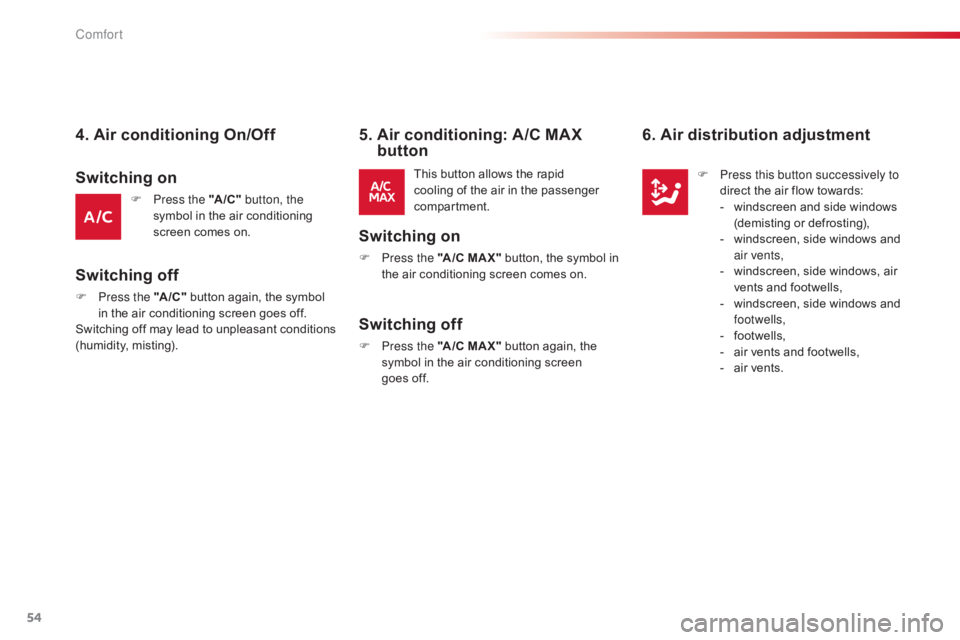
54
C-elysee_en_Chap03_confort_ed01-2016
4. Air conditioning On/Off
F Press the "A /C " button, the
symbol in the air conditioning
s
creen comes on.
Switching off
This button allows the rapid cooling of the air in the passenger
c
ompartment.
5. Air conditioning: A/C MAX button
Switching on
F Press the "A /C MA X" button, the symbol in t
he air conditioning screen comes on.
F
P
ress the "A /C "
button
again,
the
symbol
i
n
the
air
conditioning
screen
goes
off.
Switching
o
ff
m
ay
l
ead
t
o
u
npleasant
c
onditions
(h
umidity,
m
isting).
Switching on
Switching off
F Press the "A /C MA X" button again, the s
ymbol in the air conditioning screen
g
oes off.
6. Air distribution adjustment
F Press this button successively to direct the air flow towards:
-
w
indscreen and side windows
(
demisting or defrosting),
-
w
indscreen, side windows and
a
ir vents,
-
w
indscreen, side windows, air
v
ents and footwells,
-
w
indscreen, side windows and
f
ootwells,
-
f
ootwells,
-
a
ir vents and footwells,
-
a
ir vents.
Comfort
Page 57 of 260
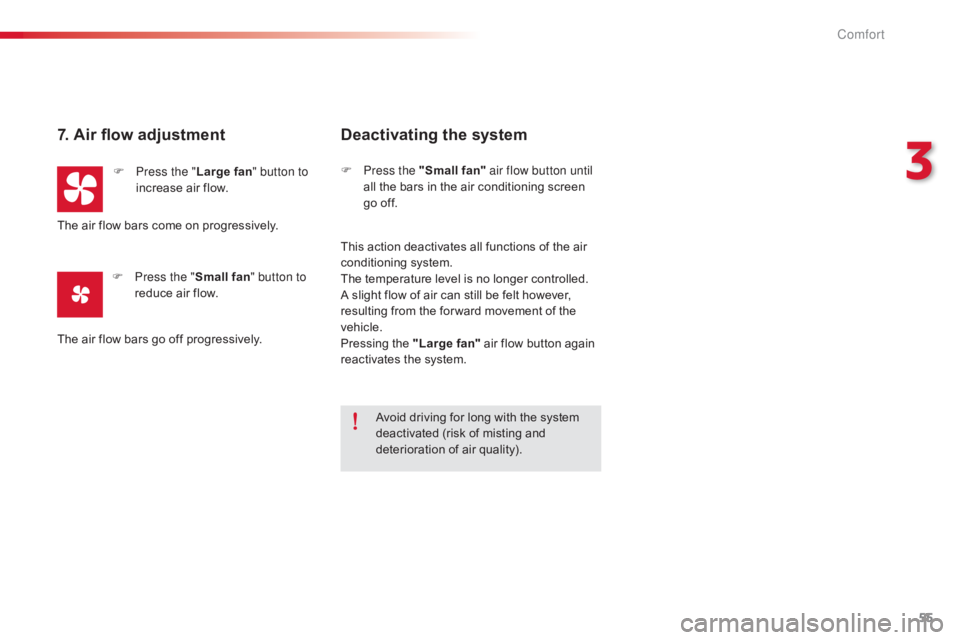
55
C-elysee_en_Chap03_confort_ed01-2016
7. Air flow adjustment
F Press the "Large fan" button to
increase air flow.
F
P
ress the " Small fan " button to
reduce
air flow.
Deactivating the system
F Press the "Small fan" air flow button until
all the bars in the air conditioning screen
g
o off.
This
action deactivates all functions of the air
c
onditioning system.
The
temperature level is no longer controlled.
A
slight flow of air can still be felt however,
r
esulting from the for ward movement of the
v
ehicle.
Pressing
the "Large fan"
air flow button again
r
eactivates the system.
The
air
flow
bars
come
on
progressively.
Avoid
driving for long with the system
d
eactivated (risk of misting and
d
eterioration of air quality).
The
air
flow
bars
go
off
progressively.
3
Comfort